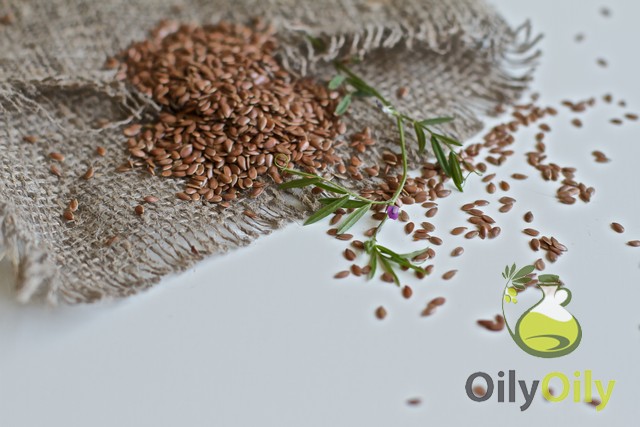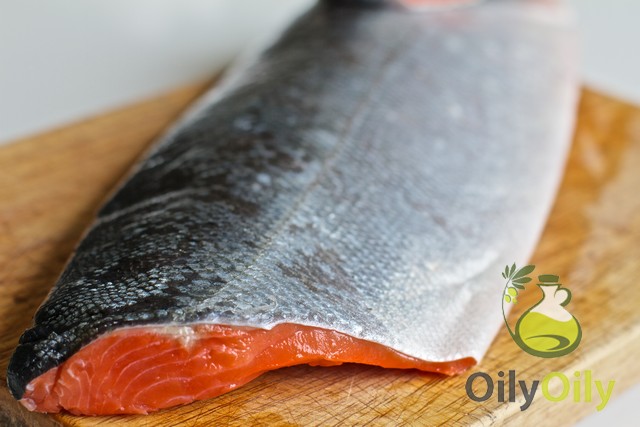
Safflower oil contains linoleic acid converted in our body into conjugated linoleic acid, which is a popular weight loss ingredient. This polyunsaturated fatty acid may promote fat burning and help your achieve better weight loss results.
Identification
Safflower oil is derived from safflower plant. There are two different types of safflower oil. It is usually indicated on the label if this oil is high oleic or linoleic one. If you want to buy safflower oil for weight loss, search for safflower oil with the high content of polyunsaturated fats or linoleic oil. This variety of safflower oil helps lose weight.
Function
Polyunsaturated fatty acids have a lot of essential functions in our bodies. Omega-6s stabilize cell membranes and keep hormonal balance. Safflower oil and linoleic acid increase fat oxidation and burn brown fat. CLA received from linoleic acid suppresses weight gain, lessens the fat percentage in the body and enlarges lean body mass.
The consumption of safflower oil instead of animal fat or trans fats is beneficial for the weight control. Fatty acids of animal origin or hydrogenated fats increase the risk of cardiovascular diseases and can lead to obesity. Safflower oil used to replace them will help you avoid such problems. Moreover, you may take safflower oil together with protein smoothies. They will fill you up and boost fat burning, as Jeff Anderson in its “Combat the Fat” writes.
CHOOSE THE RIGHT OIL! Coconut Oil and Weight Loss
Does safflower oil reduce belly fat
There is an opinion that safflower oil helps reduce belly fat. Some clinical studies show that safflower oil really lessens belly fat. Ohio State University carried out a study in 2009 where they tested safflower oil on obese postmenopausal women with diabetes of type II. They ingested 8 g of safflower oil every day. After 16 weeks they reduced 2 to 4 lbs. of belly fat.
According to the study described in the American Journal of Clinical Nutrition in September, 2009 safflower oil raises the production of adiponectin, a hormone connected with fat metabolism. However, more studies are needed to answer the question: “Does safflower oil reduce belly fat?” with no doubt.
Consumption of safflower oil for weight loss
The following steps will help you lose weight and maintain a healthy body.
- Search for expeller-pressed oil high in linoleic acid. Linoleic acid is an essential fatty acid that should be received from nutrition, it is not produced by the body.
- Mix 2 teaspoonful of safflower oil with yogurt and fresh berries. Add flaxseed to raise the fiber content.
- Make your own salad dressing from 1 tbsp. honey, 2 tbsp. of balsamic vinegar and 2 tbsp. of safflower oil. Sprinkle over steam vegetables or a fresh salad.
Considerations
Although safflower oil is connected with reducing belly fat, it is still fat. The excessive intake of any type of fat will contribute to weight gain. According to the recommendations of the U.S. Department of Health and Human Services a daily fat intake should be 20 to 35 % of the total daily calories. Don’t simply add safflower oil to your nutrition; substitute it for any other fats. To reduce weight and get rid of belly fat, it is necessary not only to consume safflower oil as a part of the weight-reducing diet, but also to do regular physical activity.
]]>
Let’s find out what flaxseed oil is and what the health benefits of flaxseed oil are.
Flaxseed oil composition
Flaxseed oil is derived from a plant with blue flowers (common flax, also known as linseed or Linum usitatissimum) grown for making edible oil from seeds, for the wood finishing industry and for making linen. Accoding to the University of Meriland Medical Center, flaxseed oil contains a high quantity of omega-3 fatty acids, including a large amount of alpha-linolenic acid ALA. ALA is considered a precursor to EPA, eicosapentaenoic acid, and DHA, docosahexaenoic acid. It is converted into them in the body. Flaxseed oil is also rich in omega-9 and omega-6 essential fatty acids, vitamins B, lecithin, potassium, magnesium, protein, zinc and fiber.
SEE ALSO: 5 Major Health Uses for Flaxseed Oil
Flaxseed oil benefits
Essential fatty acids in flaxseed oil, especially omega-3 ones, are highly recommended for people’s well-being and for the activity of every system of the body. Scientists call flaxseed oil one of the important supplements to our nutrition. According to Elaine Magee, MPH, RD, it benefits for:
- Overall health of the organism and its systems: cardiovascular system, circulatory system, immune system, nervous system, reproductive system and joints;
- Weight loss;
- Energy production and it improves stamina as well;
- Hair and skin;
- Bodybuilders;
- Dogs and other.
Let’s consider health benefits of flaxseed oil in more details.
Lowering blood pressure
According to INTERMAP, an International Study of Macro- and Micro-nutrients and Blood Pressure, people consuming 2 g of omega-3 fatty acids daily have notable lowering of blood pressure. However, omega-3 fatty acids in flaxseed oil can’t be the only remedy for high blood pressure.
SEE ALSO: How Much Flaxseed Oil per Day We Need?
Lowering the risk of cardiovascular diseases
As Omega-3 fatty acids lower blood pressure and triglycerides level, adding flaxseed oil to your diet can lower the risk of heart diseases and heart attack. ALA in flaxseed oil leads to the reduction in blood clots, the promotion of blood vessel elasticity and even the decreasing of arrhythmia risk.
Reducing inflammation
The body must get the sufficient amount of omega-3 fatty acids from oils to produce prostaglandins of series 1 and 3. They are small hormone-like substances, which have a strong anti-inflammatory effect at the cells. According to the World’s Healthiest Foods, flaxseed oil is a rich source of omega-3 oil, thus it promotes these prostaglandins production. This lets balance the influence of series 2 prostaglandins that have pro-inflammatory effects and can aid in treating asthma, migraines and osteoarthritis. Therefore, flaxseed oil benefits bone health as well.
Weight loss
Omega-3 fatty acids in flaxseed oil have the molecular structure that increases the rate of metabolism in the body. They help speed up the fat oxidation in the liver. It is highly beneficial for overweight and obese people who need to lose weight.
READ MORE: Flaxseed Oil and Weight Loss
Dangers
Notwithstanding health benefits and although it can be called safe, flaxseed oil has some contraindications and possible dangers. It is dangerous for pregnant women and people with bleeding problems. It may interact with medications. So always talk to your doctor before consuming flaxseed oil.
]]>

Flax is a plant with blue flowers that has seeds rich in oil with a nutty taste. Seeds are rich in fiber, vitamins, protein, minerals and, what is very important, essential fatty acids that possess a lot of health benefits. Flaxseeds are available in ground form but they are also cold-pressed to receive flaxseed oil. Flaxseed oil is rich in alpha-linolenic acid, the omega-3 essential fatty acid.
Omega-3 fat is known as good and heart-healthy unlike animal saturated fats known as leading to obesity and cardiovascular diseases. The activity of flaxseed oil for weight loss is sometimes called among flaxseed oil benefits because essential fatty acids boost metabolism, suppress appetite and curb cravings.
Appetite suppression
The essential fatty acids found in flax seeds help the stomach to keep food for a longer period. If we add flaxseed oil to our meal, the food goes into our small intestine more gradually, that slows down digestion and aids in insulin levels regulation. As a result, we experience a gradual decline in our blood sugar levels, which give more energy and a sense of fullness.
SEE ALSO: Coconut Oil and Weight Loss
Metabolism promotion
The essential fatty acids of flaxseed oil provide help to raise the metabolic rate of the body. As a result, you burn excessive fats including unhealthy ones not necessary for the body, as Dr.Sears sattes.
Curbs cravings
They say that it is useful to take flaxseed oil for weight loss as there is an opinion that our body looks for the essential nutrients in every food we eat. When it feels the lack of them, we crave something to eat all the time and start eating sweets and fats and put on weight. Flaxseed oil has essential nutrients needed to our body and can stop these cravings.
Contradictions
However, the question of flaxseed oil and weight loss is disputable. The proofs of flaxseed oil effectiveness for weight loss are all indirect and need more studies. Some researches state that flaxseed oil for weight loss is not effective or at least much less effective than whole flax seeds. According to MayoClinic, lignans and fiber are absent in flaxseed oil unless lignans are especially added to it. Dietary fiber in flax seeds helps digestion and induces the feeling of fullness, thus, fiber-rich flax seeds are more beneficial for weight loss and appetite control.
Moreover, flaxseed oil has much more calories than ground flaxseed. A 1 tbsp. serving of flaxseed oil contains 120 calories while ground flaxseed contains just 37 calories per 1 tbsp. serving.
IMPORTANT! Flaxseed Oil Nutrition Facts
Flaxseed oil intake
The advised dose of flaxseed oil for weight loss is one-two tsps. every day during the mealtime. Adding flaxseed oil to each meal raises the nutritional value of food we eat, especially cabbage and yogurt rich in sulfated amino acids. Animal, soy and fish proteins aid in the essential fatty acids absorption into the cell membranes.
Flaxseed oil has a short shelf life, so try to buy smaller bottles, which have been refrigerated in a store.
]]>
According to the reports of the American Heart Association, obese people are prone to health complications. They often suffer from high blood pressure, heart disease, diabetes and sleep apnea. While exercise and diet are key factors necessary for a functional and healthy body, supplements becomes more popular constituent of the weight loss formula. There are thousands of natural supplements in the market intended for weight loss and fish oil is among them. It is proved that fish oil supplements are beneficial for health and their ingredients are of vital importance for certain body functions. However, the effectiveness of fish oil for weight loss turns out to be less than marketing states.
Fish oil constituents
Fish oil is rich in omega-3 fatty acids, including the most important eicosapentaenoic acid EPA and docosahexaenoic acid DHA. All fish possesses fish oil, cold-water fish such as mackerel, cod and salmon possess the most. Though fish oil can be called fat, it’s not the fat that your body accumulates and leads to extra weight, this fat is necessary for your body functioning even if you follow a low-fat diet.
SEE ALSO: Coconut Oil and Weight Loss
Fish oil benefits
According to the Mayo Clinic, EPA and DHA of fish oil help reduce the risk of heart attack, normalize blood pressure and prevent atherosclerotic plaque. Our body takes omega-3 fatty acids from fish oil to prevent blood clotting and to build membranes of brain cells. These fatty acids have an anti-inflammatory effect that helps prevent serious diseases like sprue, inflammatory bowel disease and short bowel syndrome.
Fish oil and weight loss
While researches have shown that omega-3 fatty acids and other constituents of fish oil benefit for a healthy body, the statement “fish oil for weight loss” is only a marketing course. Nothing connects fish oil and weight loss.
According to the study carried out by the Cooper Institute in Dallas, Texas, when people’s diet includes fish oil weight loss is not an obligatory result. In their experiment 128 overweight people take the recommended fish oil dose or a placebo for 24 week period. People not only consume fish oil supplements, but also do cardiovascular and resistance training exercises. The result of the study was astonishing. Individuals consuming fish oil lost an average of 11 lb while those taking a placebo lost 13.2 lb in average. However, people consuming fish oil felt an improvement in the heart health although they didn’t experience any effect of fish oil for weight loss. Thus, fish oil and weight loss are not interconnected.
As the National Institutes of Health reports, if you already keep to a diet and do enough exercise, fish oil won’t provide you help in losing more weight. Fish oil may only help improve your health conditions, lower your blood pressure level, prevent heart disease. The most you can get from fish oil for weight loss is that it will make your muscles stiff and your joints healthier and you will be able to do more physical exercises to lose weight.
]]>
Olive oil is derived from crushed and pressed olives, is an important part of the Mediterranean diet. It is considered to be one of the healthiest dietary oils and is widely used for cooking, seasoning and flavoring. The most beneficial for health are virgin and extra virgin types of olive oil as they are minimally processed. As the content of calories in olive oil is rather high, it is a good source of nutrients to our body. Nevertheless, being a pure fat, olive oil should be taken in moderation as any other high-calorie food. Therefore it is very important to know how many calories olive oil contains and olive oil nutrition facts.
Calories and Fats
There are about 119 calories in one serving of olive oil which is 1 tablespoon. All of these calories come from fat. This means you should be mindful not to add too many calories into your diet with this particular product.
An average adult needs from 20 to 35% of daily calories to come from fats. As it was mentioned before, olive oil is a pure fat, which consists from saturated (about 14%) and unsaturated fats (about 86%). As the unsaturated fats in olive oil are predominant, it is considered to be healthy and good for heart. The unsaturated fats are mostly monounsaturated (approximately 73% of all fats). They work to reduce ‘bad’ cholesterol level in your blood thus preventing from heart diseases. Olive oil provides to human’s body omega-9 fatty acids, omega-6 fatty acids and omega-9 fatty acids (also called oleic acids). This makes olive oil nutrition source of the highest quality with various health benefits.
SEE ALSO: 6 Substitutes for Olive Oil
Vitamins
Olive oil is rich in Vitamin K (62mcg in 100g of oil), which is mostly found in leafy green vegetables. This vitamin is necessary for good blood clotting and the maintaining of bone density. 100g of olive oil provides 59% of recommended daily allowance of Vitamin K. Another very important vitamin contained in olive oil is Vitamin E. It is needed for cardiovascular health. 100g of olive oil covers almost total recommended daily allowance of this vitamin (93%).
Minerals and Polyphenols
Iron, potassium, sodium and calcium are the minerals contained in olive oil. They have several functions, the most important of which is to support cardiovascular system. Iron’s function is to help red blood cells to move oxygen to all cells in our body. The nerves and muscles proper function depends on such electrolytes like potassium, sodium and calcium. This makes olive oil to be a good source of minerals needed for your heart and body on the whole. What is more, olive oil contains polyphenols, which are antioxidants derived from plants. They protect the cells of your body from damage. The highest amounts of polyphenols can be found either in virgin or in extra virgin olive oils.
Use
Being aware of olive oil calories content and other nutrition facts will help you to use this oil with the maximum benefits to your health. Use the high-quality extra virgin oil sparingly, do not overeat it and you won’t have any problems with weight gain and other fat-related diseases.
SEE ALSO: Is Olive Oil Bad for You?
]]>
Most people keeping to a diet to lose weight avoid fat. They believe that fat contains a lot of calories and lead to overweight. However, calories are not the only thing necessary to lose or gain weight. The fact is that coconut oil contains a special type of fat. It has medium-chain triglycerides that can help you with the task of weight loss.
Increasing Metabolism
We recommend coconut oil for weight loss because it can increase metabolism in the body. Very often extra weight is a result of people’s slow metabolism. Then their bodies need fewer calories than people with a fast metabolism need. Researches have shown that medium-chain triglycerides in coconut oil in comparison with long-chain triglycerides of olive oil, for example, speed up metabolic processes and help the body burn calories.
See Also: Ever Wondered What Coconut Oil Brand Is the Best?..
Giving the Feeling of Fullness
To lose weight you need to consume fewer calories than you burn. Hunger often prevents from losing weight effectively. If you consume coconut oil weight loss can be easier. Keeping to a coconut diet makes you feel full. Coconut oil gives the feeling of satiety the absence of which usually interferes with the process of weight loss. Researches comparing the influence of various fats on satiety show that substituting medium-chain fatty acids contained in coconut oil for long-chain fatty acids contained in canola oil, olive oil and other vegetable oils decreases energy intake due to the participants’ feeling of satiety.
Decreasing Fat Deposits
One more benefit of coconut oil for weight loss is its property not to be stored as fat. The main fat of coconut oil medium-chain triglycerides assimilate well by our body. They are absorbed quicker than other fats directly from the gastrointestinal system. So coconut oil is more likely to be consumed for energy than other vegetable oils. The quick absorption leads to increase in energy expenditure. Your body won’t store fat from coconut oil and weight loss will be the result of it.
Usage of Coconut Oil for Weight Loss
You can see that coconut oil and weight loss are interconnected. When you use coconut oil weight loss is facilitated as coconut oil boosts metabolic speed, reduces your appetite and lessens fat deposits in the body. Moreover, coconut oil has a lot of health benefits and your body will be grateful for it. Just substitute coconut oil for part of your current oils and fats, diversify your nutrition with a coconut oil diet. You’d better use virgin unrefined coconut oil as it is more beneficial and all the same stable at high temperatures and can be used for vegetables sautéing, frying meat, fish and eggs or baking. Remember when you are hungry you can eat a spoon of coconut oil and weight loss won’t be stopped as coconut oil calories will be easily used for energy, not for fat storage.
Want to buy coconut oil? Here are our 2 personal choices:
Coconut Oil Organic Ext Virgin, 54 oz - Vitamin Shoppe ($23.99) - web only special (free shipping)!
Nutiva Organic Extra Virgin Coconut Oil, 15-Ounce Pack of 3 (amazon price $30.85)

At least once everybody’s heard of the amazing olive oil health benefits. We know that olive oil is rich in unsaturated fatty acids. It can aid with your heart problems, lower bad cholesterol and even control diabetes. But have you ever asked: “Is olive oil bad for you?”. The fact is that when used in an improper way olive oil may increase cancer risk and cause overweight. Let’s try to find out if olive oil is bad for you and look for the disadvantages of olive oil that make habitually beneficial oil harmful and damaging.
Olive Oil Interacts with Free Radicals
Olive oil easily reacts with free radicals and chemical substances that results in hydrogenated oil formation or even trans fats can be produced during the chemical reaction. That’s why the answer to the question: “Is olive oil bad for you?” may be positive. In this case it’s better to change the question a little and ask: “Is olive oil bad for you when heated?” Heat speeds up chemical reactions. Heated olive oil becomes dangerous, that’s why they say not to heat olive oil and not to use it for frying. Moreover, extra-virgin olive oil is so sensitive to heat that you should avoid any kind of heating it (stir-frying, sautéing or others). It’s preferable to consume olive oil in raw form to achieve all health benefits of it and not to risk your health. And when you cook, substitute palm oil or coconut oil with stable fat structures and high smoke point for olive oil.
Unbalanced Nutrition
One more danger of olive oil is connected with excessive consumption of olive oil and nutritional imbalance as a result. Consuming too much olive oil may lead to dietary imbalance. People’s alimentary system digests fat slower than other food. That’s why fatty food is so nourishing. And when we eat a lot of oil we consume less meat, vegetables, fruits and whole grains. And this can result in imbalance of nutrients in our bodies.
Immoderate Fat Consumption
Excessive intake of fat may raise the risk of heart attack. If you get over 35 percent of total calories with fatty food you are under the threat of heart problems. Although olive oil is better than butter, lard or any other animal fat, excessive amount of any fat may do you harm. So don’t add olive oil to animal-based fats, use olive oil instead of them.
Olive Oil Helps Gain Weight
One more case the answer to the question: “Is olive oil bad for you?” may be YES is when you try to lose weight and eat a lot of vegetables with olive oil. Olive oil is fat, indeed. And it has a lot of calories, 9.4 calories per gram or 120 per tablespoon. So when you eat a lot of oil your weight will rise. One tablespoonful for you will be enough. In case you eat more oil remember to do physical exercises to burn excessive fat.
If you follow the above-mentioned suggestions and eat just one tbsp of unheated extra virgin olive oil per day you will always answer the question: “Is olive oil bad for you?” that olive oil is helpful and does you only good.
]]>